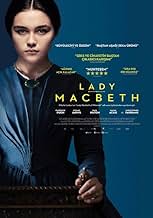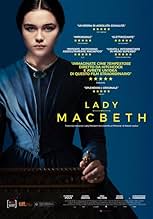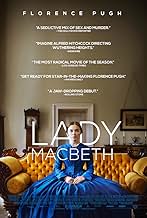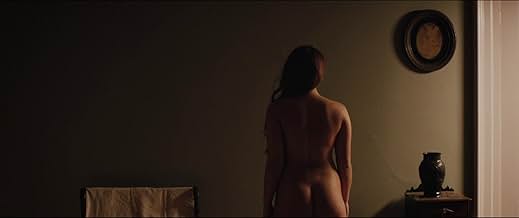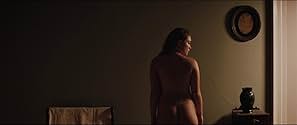In 19th-century rural England, a young bride who has been sold into marriage discovers an unstoppable desire within herself as she enters into an affair with a worker on her estate.In 19th-century rural England, a young bride who has been sold into marriage discovers an unstoppable desire within herself as she enters into an affair with a worker on her estate.In 19th-century rural England, a young bride who has been sold into marriage discovers an unstoppable desire within herself as she enters into an affair with a worker on her estate.
- Nominated for 2 BAFTA Awards
- 24 wins & 58 nominations total
Kema Sikazwe
- Farmhand
- (as Kema Slkazwe)
- Director
- Writers
- All cast & crew
- Production, box office & more at IMDbPro
Featured reviews
If I were the producer of this film, I'd have chosen a different title. I'm sure lots of moviegoers are going to be misled: this film has nothing to do with Shakespeare. It's an adaptation of a novel by the Russian author Nikolai Leskov, set in early 19th century England.
The film seems to be a pre-feminism manifesto for women's rights. It shows Katherine Lester, the submissive wife of a wealthy but abusive landowner, living in a secluded manor in the British countryside. During a prolonged absence of her husband, she rediscovers her freedom and starts an affair with one of the stable boys. Not willing to give up her newly acquired status, she starts a series of increasingly extreme actions.
The interesting thing is how Katherine evolves from victim to culprit. She seems to have learned from her husband how to use and misuse power. The lack of social conscience of which she at first is a victim, becomes a driving force for her own behaviour. Her selfishness and lack of morality is so extreme that, in the end, she betrays innocent servants. The viewer has to shift his allegiances: at first, it's impossible not to sympathize with Katherine, enjoying a free life without her heartless husband. But halfway through the film, it becomes clear that Katherine is just as heartless, as soon as she is in power.
The story is filmed in a very effective, sober style with beautiful cinematography. The lack of any music is remarkable: some elongated scenes are striking because of the silence. The oppressive atmosphere in the manor is emphasized by the camera work. The camera repeatedly shows scenes from exactly the same viewpoint. Four or five times, we see the servant Anna entering Katherine's bedroom in exactly the same way.
As much as 'Lady Macbeth' is about gender, it is also about class. It is striking that Katherine, who as a woman is considered a lower form of human life by men, herself considers the servants to be a lower form of human life. She shamelessly uses them for her own purposes and enjoyment, but doesn't care at all about their fate afterwards.
'Lady Macbeth' is a beautiful film, about issues that even nowadays are worth thinking about. But I would have named it 'Lust and loneliness' - after all, it's set in the same period as the Jane Austen novels.
The film seems to be a pre-feminism manifesto for women's rights. It shows Katherine Lester, the submissive wife of a wealthy but abusive landowner, living in a secluded manor in the British countryside. During a prolonged absence of her husband, she rediscovers her freedom and starts an affair with one of the stable boys. Not willing to give up her newly acquired status, she starts a series of increasingly extreme actions.
The interesting thing is how Katherine evolves from victim to culprit. She seems to have learned from her husband how to use and misuse power. The lack of social conscience of which she at first is a victim, becomes a driving force for her own behaviour. Her selfishness and lack of morality is so extreme that, in the end, she betrays innocent servants. The viewer has to shift his allegiances: at first, it's impossible not to sympathize with Katherine, enjoying a free life without her heartless husband. But halfway through the film, it becomes clear that Katherine is just as heartless, as soon as she is in power.
The story is filmed in a very effective, sober style with beautiful cinematography. The lack of any music is remarkable: some elongated scenes are striking because of the silence. The oppressive atmosphere in the manor is emphasized by the camera work. The camera repeatedly shows scenes from exactly the same viewpoint. Four or five times, we see the servant Anna entering Katherine's bedroom in exactly the same way.
As much as 'Lady Macbeth' is about gender, it is also about class. It is striking that Katherine, who as a woman is considered a lower form of human life by men, herself considers the servants to be a lower form of human life. She shamelessly uses them for her own purposes and enjoyment, but doesn't care at all about their fate afterwards.
'Lady Macbeth' is a beautiful film, about issues that even nowadays are worth thinking about. But I would have named it 'Lust and loneliness' - after all, it's set in the same period as the Jane Austen novels.
I'm not familiar with the Lady Macbeth of Mtsensk short story by Nikolai Neskov (not to be confused with Lady Macbeth by William Shakespeare) which he wrote as a novella in 1865, although it is inspired by the famous play.
the book inspired Shostakovich to write an opera based on it.
Now we have a British film that feels incredibly French (incredibly Michael Haneke, who I think is actually Austrian) to add to its cannon.
It features a career defining performance by Florence Pugh in the title role; although the men are magnificent too (most notably Christopher Fairbanks as the intolerant Father in Law).
If you like Christopher Fairbanks through his Guardians of the Galaxy fame this is not the movie for you as it moves at glacial pace with very little dialogue, virtually no music and a LOT of fixed frames where you are invited to enjoy the cinematography in its most bleak and spartan Northernness.
"It's grim up north" might have been the poster slogan for this movie because, set as it is near the North East of England's colliery land, albeit on the moors (North Yorkshire I'd suggest), it is most certainly grim.
The story is murderously grim too and I'd expect this BBC Films production to be in the running when next year's BAFTA's are handed out with Florence Pugh a shoe in for best female actor.
Slow but sublime with excellent direction from William Oldroyd.
the book inspired Shostakovich to write an opera based on it.
Now we have a British film that feels incredibly French (incredibly Michael Haneke, who I think is actually Austrian) to add to its cannon.
It features a career defining performance by Florence Pugh in the title role; although the men are magnificent too (most notably Christopher Fairbanks as the intolerant Father in Law).
If you like Christopher Fairbanks through his Guardians of the Galaxy fame this is not the movie for you as it moves at glacial pace with very little dialogue, virtually no music and a LOT of fixed frames where you are invited to enjoy the cinematography in its most bleak and spartan Northernness.
"It's grim up north" might have been the poster slogan for this movie because, set as it is near the North East of England's colliery land, albeit on the moors (North Yorkshire I'd suggest), it is most certainly grim.
The story is murderously grim too and I'd expect this BBC Films production to be in the running when next year's BAFTA's are handed out with Florence Pugh a shoe in for best female actor.
Slow but sublime with excellent direction from William Oldroyd.
I was enthralled by this movie from start to finish. The cinematography and sound were excellent. The complete absence of a music soundtrack except for two notable atmospheric crescendos added to the overall oppressiveness of the story and the location. All of the performances were excellent and the lead was outstanding IMO. The story was in many ways familiar - being evocative of Bronte and Hardy - with its portrayal of Victorian country gentry and the brutality and sense of entitlement that sometimes occurred between the classes but the way the story unfolded frequently surprised me by not following through in the way one might have expected it to. I too would recommend a cinema viewing in order to get the full effect of the landscape and the oppressive silence of the house.
The story starts with a marriage. When the wedding is over, we all expect a romance to accure. Though all we observe is a loveless husband who's going to enslave his woman as a figure in a cage. The powerless lady who had tried to be a devoted compliant wife by obedience, receives no reward in return. Untill this part you've already made your side. You excessively sympathize with the oppressed lady.
But soon after, everything changes. In the absence of her husband, she finds her power and freedom to rule the house. The woman who's been inadequatly satisfied in love and passion, makes an affair with one of his stable workers. The taste of freedom to rule makes her insane to do anything to maintain the condition, even if it means she has to murder someone, has to enslave others or has to sacrifice her love.
The movie indicates how feasible it is for an innocent hunt to be the predator hunter, if they find the moment. The performances of Florence Pugh, Naomi Ackie and Cosmo Jarvis are mesmerizing. Although the script, to put it bluntly, is not perfect, I liked it. All in all, it absolutely worth watching and I recommend you to do so.
But soon after, everything changes. In the absence of her husband, she finds her power and freedom to rule the house. The woman who's been inadequatly satisfied in love and passion, makes an affair with one of his stable workers. The taste of freedom to rule makes her insane to do anything to maintain the condition, even if it means she has to murder someone, has to enslave others or has to sacrifice her love.
The movie indicates how feasible it is for an innocent hunt to be the predator hunter, if they find the moment. The performances of Florence Pugh, Naomi Ackie and Cosmo Jarvis are mesmerizing. Although the script, to put it bluntly, is not perfect, I liked it. All in all, it absolutely worth watching and I recommend you to do so.
This film tells the story of a young woman who is sold into a loveless marriage with an older wealthy gentleman. She has a passionate affair with a servant of the house. The promise of a happier life eludes her, until she takes full control of the situation.
Initially I thought the film was really about Macbeth's wife, but I soon learn that it is not the case. The title comes from the similar ruthlessness and cold bloodedness that the leading woman and Lady Macbeth have. It is engaging to see how Katherine transforms from a timid woman into a sociopathic woman who will stop at nothing to get what she wants. The pacing is a little slow, with artistic shots lasting 10 or even 20 seconds but does not really help story telling. Overall, the story is good and Katherine's character is very interesting.
Initially I thought the film was really about Macbeth's wife, but I soon learn that it is not the case. The title comes from the similar ruthlessness and cold bloodedness that the leading woman and Lady Macbeth have. It is engaging to see how Katherine transforms from a timid woman into a sociopathic woman who will stop at nothing to get what she wants. The pacing is a little slow, with artistic shots lasting 10 or even 20 seconds but does not really help story telling. Overall, the story is good and Katherine's character is very interesting.
Did you know
- TriviaFlorence Pugh said she loved her nude scenes in this film. Pugh reflected on her breakout role during an interview for Britain's ES Magazine and admitted the part "changed everything" for her. "I loved the fact she was naked all the time. At that point in my life, I had been made to feel shit about what I looked like and that film was perfect. There was no room for me to feel insecure."
- GoofsA Cornish Rex cat first appears at 14:30. The breed first appeared around 1950.
- ConnectionsFeatured in The EE British Academy Film Awards (2018)
- SoundtracksPraise to the Lord, the Almighty
(uncredited)
German folk tune
Lyrics by Joachim Neander, translated by Catherine Winkworth
- How long is Lady Macbeth?Powered by Alexa
Details
- Release date
- Countries of origin
- Official sites
- Language
- Also known as
- Леді Макбет
- Filming locations
- Lambton Castle, Chester-le-Street, County Durham, England, UK(The Lesters' home)
- Production companies
- See more company credits at IMDbPro
Box office
- Budget
- £500,000 (estimated)
- Gross US & Canada
- $1,129,408
- Opening weekend US & Canada
- $64,537
- Jul 16, 2017
- Gross worldwide
- $5,343,632
- Runtime
- 1h 29m(89 min)
- Color
- Aspect ratio
- 2.39 : 1
Contribute to this page
Suggest an edit or add missing content






